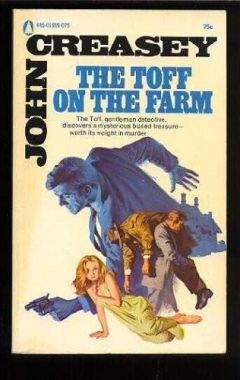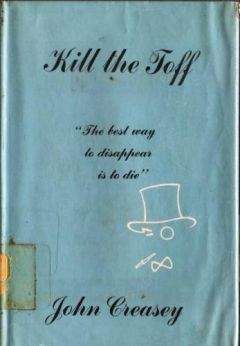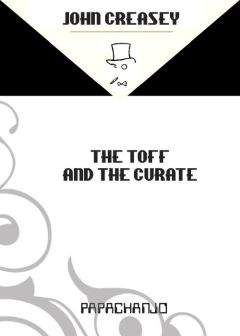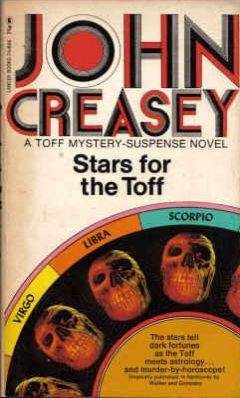John Creasey - The Toff And The Stolen Tresses
На сайте mybooks.club вы можете бесплатно читать книги онлайн без регистрации, включая John Creasey - The Toff And The Stolen Tresses. Жанр: Прочее издательство неизвестно,. Доступна полная версия книги с кратким содержанием для предварительного ознакомления, аннотацией (предисловием), рецензиями от других читателей и их экспертным мнением.
Кроме того, на сайте mybooks.club вы найдете множество новинок, которые стоит прочитать.
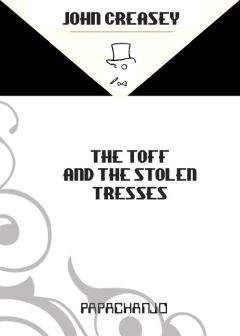
John Creasey - The Toff And The Stolen Tresses краткое содержание
The Toff And The Stolen Tresses читать онлайн бесплатно
Each trophy was from a case on which he had worked; some, from cases on which he had nearly died. A few came from investigations where he had actually worked with the approval and the blessing of the police. Most of these were of recent date, for either the Toff or the police had mellowed, and he had always had one supporter at the Yard, in Superintendent William Grice.
Superintendent Grice, according to three of the five newspapers which Rollison glanced through, was in charge of the investigation into the attack on James Matthison Jones at 24 Middleton Street, S.W.
Jolly poured out coffee while Rollison read, and turned to leave, silent as any wraith. When he was at the door, Rollison murmured:
“Jolly.”
“Sir?”
“How are you this morning?”
“Very well, sir, thank you.”
“Good. Mind working?”
Jolly, coffee pot in hand, turned back to the breakfast table, which stood in a window alcove, overlooking other houses and other flats; the street window was on the other side of the room.
“As far as I know, sir.” He was cautious. “Read the newspapers?”
“I have perused them lightly, sir.”
“You mean you’ve read every line under the heading of crime. What strikes you as being odd?”
“Mr. Grice being engaged on the matter of the assault at Middleton Street,” Jolly answered promptly.
“Why is that odd?”
“One would have expected the Divisional police to deal with such a matter, sir, not Scotland Yard, and certainly not a senior Superintendent.”
“You couldn’t be more right,” agreed Rollison, and pushed his chair back and took cigarettes from his dressing gown pocket. “Jolly,” he went on, “I have a confession to make. I have been dreaming beautiful dreams. I am tired of the sordidness of the Big Smoke or the Great Metropolis, whichever you prefer to call it. I long for the freshness of unsullied crimes, where young men do not get bashed over the head and old women are not murdered for a few bob a time, and gangs of hooligans do not set upon a boy and girl, simply because the boy, once one of them, has fallen in love with the girl. I do not think that I am greatly taken by this modern age, Jolly, particularly on a morning like this. Is it my imagination, or is London much, much worse than it was?”
Jolly kept a rigidly straight face except for the movement of his lips.
“It is your imagination, sir.”
Rollison eyed him thoughtfully, and then said: “Oh, is it? For that you may spend today looking out the newspapers of the—what date is it?”
“May the seventeenth, sir.”
“May the seventeenth of each of the last twenty-one years. We’ll have the Globe, the Wire, the Sun-Record and The Times, just to get a balanced view, and we shall count the number of new crimes reported on each day of each year. You may go to the newspaper offices in person.”
“Thank you, sir,” said Jolly. “Would you like more coffee?”
“Please.”
Jolly poured.
“Will you excuse me now, sir?”
“Yes.”
“Thank you, sir. May I ask whether you have read this morning’s newspapers?”
This time, Rollison was silently speculative for a long time. So far neither master nor man had allowed himself to smile, each remaining quite poker-faced. Whenever they played a game like this, it was seldom that either relaxed. Rollison studied Jolly, with the sorrowful-looking brown eyes, the rather wrinkled skin, the scragginess under the chin which suggested that he had once been fat but had recently wasted away. Jolly’s lips were sensitive, and although there was a kind of dyspeptic look about him, his was a face that most people liked.
“Yes,” said Rollison at last. “I have perused the newspapers.”
“Did you observe the name of the employer of the man, Jones?”
Slowly and as if painfully, Rollison said: “No.”
“I imagined that had escaped your notice,” said Jolly, magnificently bland. “In the Globe, sir, it states that Jones worked for Jepsons. Possibly only the Globe carried that piece of information, because Jepsons own many shares in the Globe.”
“Yes, indeed,” said Rollison, and did relax and chuckle. “All right, your game, Jolly. The chap works for Jepsons. Where do we go from here?”
“I have no idea, sir.”
“Except that if the Jepsons have a problem they’ll probably bring it to us,” said Rollison, and stubbed out his cigarette. “Do we need to labour for our pieces of gold?”
“Yes, sir.”
“How much in the kitty?”
“Sufficient, sir, but a wise man—”
“Sets some aside for a rainy day. I know. No holiday in distant climes where there’s no time at all for crimes?”
“A short visit to Barbados, sir, might be advantageous.”
“Enough,” said Rollison. “I know we’ve been offered a fabulous fee to go to the West Indies and look for a missing millionaire, and I know you’ve had a lifelong ambition to visit those little islands off the coast of the U.S.A., but no thank you, not at this time of the year. There’s too much sun, too much temperature, too many lovelies and too many distractions. We might have a weekend at Blackpool, or if you feel the need for more rarefied air, at Bournemouth. If Mr. Jepson should come, I’ll see him.”
* * *
Mr. Jepson did not come that day.
The evening newspapers, and the morning and evening newspapers of the next three days all reported the condition of James Matthison Jones. At first, there were hints that he might die, but on the morning of the fourth day he was reported as being out of danger. No arrest was made.
Rollison made a few tentative inquiries, simply out of interest.
On the morning of the fifth day Miss, not Mr. Jepson, came to see him.
* * *
“Rolly, it’s sweet of you to suggest lunch but I really can’t today. I’m a Big Business woman now, and you ought to know it. And Reggie isn’t at the office today.”
Ada Jepson was a little on the small side, beautifully made-up and superbly dressed, and Rollison knew that she had as pleasant a nature as anyone in England. She had a heart-shaped face and a nice smile and dimples, too. Sweet and simple—until one tried to cheat, mislead, misinform or otherwise outrage her sense of justice. She had the most withering tongue of any young woman of Rollison’s acquaintance. “I really came to see you on business,” she went on.
She smiled as she sat dwarfed in his hide armchair, with the trophy wall behind her. Rollison was sitting on the arm of another chair. It was a little after eleven o’clock, and Jolly would soon bring coffee.
“Ah,” said Rollison. “I am a professional, remember. Jolly insists. My services will cost you a fortune.”
“Oh, that doesn’t matter!”
“So now we flaunt our riches,” murmured R ollison.
“If you mean that I believe you’re a fool if you can get what you want by paying for it, but don’t, then I’m flaunting my riches,” agreed Ada. “Not that it matters. No money in the world would buy your services if you didn’t want to give them. I’ll soon talk to Jolly about money, if you’ll say you’ll help. I do hope you will.”
“I might,” conceded Rollison.
“You don’t know what it’s about yet.”
“I could make a guess. The police are helpless and hopeless. That man Grice is utterly impossible, how on earth he even became one of the Big Five at Scotland Yard you can’t imagine. We wouldn’t have him in the packing department at Jepsons. And it’s really such a simple thing, all he has to do is find the men who attacked poor Jimmy Jones. The brutes. If beasts like these men can get away, absolutely nothing’s safe. Women will soon be afraid to open the front doors to strangers!”
Ada listened to all this while slowly clenching her small right fist; then shook it at him in mock anger.
“You’ve been talking to Reggie.”
“Not I.”
“That man Grice, then.”
“Well, we had a chat over a tankard,” admitted Rollison. “Jolly and I half expected you’d want quick results, and didn’t think you’d have much luck.”
“Oh, indeed,” said Ada, and added witheringly. “I’m sorry I’m so late.” She was frowning with exasperation, but her expression soon cleared. She leaned forward, earnest as a woman could be, looking fresh and lovely.
Rollison wondered if her earnestness explained why no one had yet married her. More likely she was trying to make sure that no one married her for her millions.
“Rolly, I know Jimmy Jones quite well,” she said. “He’s one of the best of the younger men at the firm, and we’ve been letting him have an insight into all the departments, although he doesn’t know why yet. Reggie thinks he can become really good, if he recovers.”
“He will.”
Will he really be quite all right again?” Ada asked, intently. “Or will it affect him for the rest of his life? I’ve been studying some of the reports of this kind of beating up, and in several cases the victims have become almost simple.”
“I don’t think you need worry about Jones,” said Rollison reassuringly. “I’ve a contact at the hospital who says that he’ll recover completely. His chief trouble will be resisting the desire to get his own back.”
“Well, I wouldn’t blame him,” Ada said, and went on abruptly: “Why didn’t you expect Superintendent Grice to find the two men?”
It was like Ada Jepson to go straight to the heart of a matter, without hesitation and without fencing, to see the significance of every question or comment; one had to get up very early to fool Ada.
Rollison was as frank as she deserved.
“If this had been an ordinary beating up, robbery with violence, Grice wouldn’t have been called in. You at Jepsons might have pulled some strings at the Yard to get a Superintendent, but Grice was on the job before you’d had time to—probably before you knew what had happened. So it wasn’t ordinary robbery with violence. Nor was it the first of its kind. During the past five weeks six other cases of assault have been reported, and no one has yet been arrested. The results have all been the same: a savage attack on an individual in his home, and then the home has been systematically wrecked. In this case, nothing breakable was left. According to one report there wasn’t even a cup and saucer left whole. From television set to a tea plate, everything was smashed to smithereens, and still nobody knows why. But today or tomorrow your Jimmy Jones will be able to make a statement. That may be a starting point.”
Ada contemplated Rollison with great solemnity, and then asked almost humbly:
“Will you try to find out why it happened?”
“Yes,” said Rollison, smiling. “I can’t think of anything that would keep me away.”
Ada jumped up.
“Oh, bless you!”
“Before you start blessing me or anyone else, tell me this,” said Rollison softly. “Do you know anything more at all—about this man Jones, or what lies behind the trouble?”
“Of course I don’t.”
“Nothing wrong at any of your offices or warehouses?”
Ada looked so taken aback that he believed her when she said no, as far as she was aware there was no trouble at all at Jepsons. She looked as if this was a new idea entirely, and that it worried her. But one could never be sure with Ada.
“I’ve never heard of anything, Rolly, but the truth is that we’ve got too big, you know. That sounds a ridiculous thing to say, but you know we’ve expanded a lot in the last few years, don’t you?”
“Under the direction of our Ada. Jepsons’ Mail Order, the Biggest in Britain. Jepsons’ Manufacturies, making everything from pots and pans to motor-car tyres—there’s a rumour in the city that you’re going to produce a People’s Car. Right?”
“We might, one day,” Ada admitted.
“I want a free sample,” Rollison said.
“Jepsons’ Wholesale—suppliers to retailers all over the world. Yes, you’re pretty big, Ada. Why keep expanding?”
“Well, somehow the business grows,” Ada said. “We’ve some very good directors in all the subsidiary firms. But I’ve never heard of any trouble, Rolly. Oh, my goodness, look at the time! I must fly.”
Rollison watched her leave the house. By pressing close against the window and looking into the street, he saw her step off the pavement and into her high-powered, scarlet sports car. She looked almost childlike as she sat at the wheel; and then, zooooom! and the car roared towards the corner.
She slowed down in good time.
“And no one followed her,” said Rollison to Jolly. “That’s almost a disappointment. Get Grice on the line, will you, and ask him if he can see me in about half an hour. Tell him I’m on my way.”
“Supposing he isn’t free, sir?”
“Don’t tell me you’re slipping,” said Rollison. “Persuade him not to keep me waiting too long.”
CHAPTER FOUR
Gentle Hint
Grice not only received him but was affable; so affable that Rollison began to suspect the reason before he had been in the building for five minutes. It was a pleasant office with a view of the Thames and the Embankment. On this warm morning, the sun was bright, and everything in sight was beautiful when one looked out of the window. Inside, Grice was not exactly a beauty; but he was striking-looking, tall, brown-clad, brown hair turning grey, brown eyes as sharp as they had been in all the years Rollison had known him. The skin showed white where it was stretched tight over the bony bridge of his nose.
,. . . not really surprised you’ve taken an interest in this case,” he said, “and I couldn’t wish you more luck. It’s a brutal business. Apart from the violence, there’s the deliberate wrecking of homes. That old couple in Chelsea probably won’t recover from the shock. They’ve been married forty-one years, and among the things broken were some wedding presents. Everything they’d saved was in that house, and—phutt, they lost it in half an hour.”
“Insured?”
“No.”
Rollison kept quiet for a moment, and then asked:
“How many homes broken up like it?”
“Seven now.”
“So the newspapers got that right,” murmured Rollison. Till, it isn’t often you welcome me with open arms. Were you hoping I might look in about this job?”
“Yes,” said Grice promptly. “In fact, I wanted to call and ask you to look in, but—”
“The boss said no,” suggested Rollison, narrowing his eyes and putting his head on one side. “You want me in, you’ve got six similar cases on the record, you were at Middleton Street yourself within a few hours of the job being done, yet you couldn’t catch anyone. Add all that together, and I suspect you know who’s behind it but can’t pick him up.”
“Unofficially,” said Grice, “you’re right.”
“Sure of him?”
“Them.”
“Who are they?”
“It will interest you to know that we checked up on Tiny Wallis and Mick Clay, but their alibis were so perfect that no one in his right mind would believe it. The court, judge and jury would have to accept it as evidence, though. That hint broad enough for you?”
Похожие книги на "The Toff And The Stolen Tresses", John Creasey
John Creasey читать все книги автора по порядку
John Creasey - все книги автора в одном месте читать по порядку полные версии на сайте онлайн библиотеки mybooks.club.
